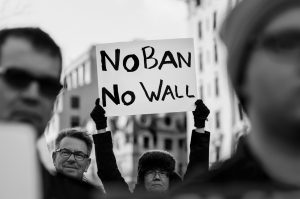The 2020 presidential election: The least presidential of them all
September 28, 2017
When I was in the fifth grade, I read an absurd book called “The Kid Who Ran For President”. It was about a young, charismatic boy named Judson Mood who took on the political establishment — the mature and political adults. Mood appealed to the ignorant and impressionable to ultimately win the presidential election and become the first pre-teen president in the history of the United States. At 10-years-old, I thought that although the book was entertaining, it was incredibly unrealistic and could never have any parallels with real politics in the United States. As it turns out, 10-year-old me was quite ignorant.
When you picture a U.S. political candidate, what do you see? Do you see a seasoned congressman? Do you envision a credentialed military advisor? A professional lawyer? If you answered yes to any of these questions, you may have to begin to reevaluate your idea of the modern political candidate. Just last year, for the first time in United States history, a man without any prior political or military experience was elected president. And it’s not just a fluke. Recently, there have been a myriad of public figures running for political positions, who have no such a backgrounds, but rather backgrounds in singing, acting or performing. These include figures such as Dwayne Johnson (or as we know him, The Rock), a movie actor and former WWE wrestler most famous for his biceps; Kanye West, best known for his rap music and avant-garde clothing line, and asking Mark Zuckerberg to “invest one billion dollars into Kanye West ideas” and Kid Rock, a country singer with a controversial past, including Confederate flags and sex tapes. These people may very well be the next presidential candidates of the United States. We must start coming to terms with this, as well as the fact that our political landscape is changing, and changing fast.
In July 2016, Dwayne Johnson declared in an interview regarding his potential presidential candidacy that if he “felt that [he] could step up to the plate and become a tremendous leader and make a real difference and make change, [he] would do it.” Soon thereafter, Kid Rock launched an official campaign website for his Michigan Senate run in 2020. Late this past August, Shailene Woodley demonstrated interest in politics as well. This movement has reached a level of prominence that demands discussion.
Whether you believe that these pseudo-politicians are, in fact, competent enough to govern our country just as well as a seasoned senator can, or, instead, posit that said politicians merely use their charisma to appeal to the fallacious insecurity and ignorance of the people, it is clear that there are specific inner-workings at play here.
Adam Bellows, AP Comparative Government, U.S. History and Sociology teacher at Dougherty Valley High School argues that these public figures feed off of a growing “discontent with the current political system.”
In short, a group of people, a certain nation if you will, is not satisfied with their lives and therefore are not satisfied with the way things are run, as they naturally attribute their shortcomings to government. Subsequently, all it takes is for a captivating figure to march onto the political stage and effectively say, “our current leadership sucks; I will fix that for you,” for people to get on board with the given candidate.
Moreover, Bellows comments: “There’s [a] growing sense from all sides of the political spectrum that those people in power, the bureaucrats, the institutions, […] are not serving the interest of the people.”
Whether or not this “feeling” is misguided, it is one of the main contributors as to why people have felt disconnected from the current political establishment.
Now that there is have an idea of how these un-political politicians have gained popularity and legitimacy, we should focus on what will happen as a result of this new political trend. Historically, people have associated a lack of experience with a lack of competency. They possessed their own filter that an individual needed to pass through in order to become politician-worthy. But, it seems that in modern political culture, we no longer make the same association. We believe (opposite from before), that these charismatic figures, who purely constitute charm, powerful rhetoric and competent appearance, possess the know-how and political acuity to affect real change in the world. This change in ideology can be seen even in incumbent politicians.
For instance, Bill Dodd, a California state senator, said this: “I would hate to see the public in general seeing the Donald Trump example and never electing anybody that lacks government experience.”
This case of a state senator supporting the idea of a celebrity as a politician clearly demonstrates the change in sentiment of the public regarding what it takes to become an elected official these days.
So, the people give the okay on this phenomenon. But is their feeling justified?
Bellows took the opposing side to comment: “If political parties and officials in office are not actually passing policy that people are asking for … [they’ll either be] elected out of office, or there will be some type of larger political or cultural revolution.”
Furthermore, if we consider the example of Donald Trump, a president with no former political or military experience, we learn that these sorts of figures are highly susceptible to not only personal scandals which ruin their image, but also policy blunders which destroy their esteem. Similarly, these types of political candidates, as explicated above, feed off of the desperation and hopefulness of the people, causing a radicalization of their platform. And a highly radical policy platform is often synonymous with a highly disadvantageous real world impact. For example, one could argue that Trump’s radical views on immigration and climate change led to the political mishaps of the travel ban (deemed unconstitutional by federal courts) and the defunding of the Environmental Protection Agency (condemned by scientists across the globe). However, it does not seem like these substantive arguments against a faux-populist regime have penetrated the consciousness of those riding the Dwayne “The Rock” Johnson or the Kanye West presidential band-wagons. In fact, these personalities have seemingly gained more support. A supporter of the Rock’s campaign officially registered the Run The Rock 2020 party with the Federal Election Commission, and with a poll demonstrating that he would take the cake in a new election. Furthermore, Mark Cuban, the famous reality television host, announced he would strongly consider running and was able to engage with several news reporters about his presidential possibility. But don’t worry, that’s not all: Mark Zuckerberg has also been eyeing the political game, as he recently hired Hillary Clinton’s pollster during her election run. Aside from these cases, there have been a myriad of celebrities announcing, seemingly out of nowhere, that they are running in 2020. Most people would take it as a harmless joke, but after all that has happened, we should be more careful.
Now, of course, this aforementioned trend appears unprecedented — something completely injurious that we haven’t seen until just recently. But, if we closely examine the nature of the presidential election and its candidates, we may see that the trend is not as unusual as we think. In the case of celebrity politicians, charisma and rhetoric play a major role in their appeal power. However, most politicians running for office throughout history also utilized the same tools. Especially recently, presidential debates have not been a place to hold mature and intellectual discussion about real issues, but more so a platform to attack and belittle the political opponent with empty rhetoric or deceitful persuasion. Even going as far back as the 90s, Bill Clinton ran his 1993 campaign off of an ideal that he would not have been endorsed otherwise if he was not pressured into doing so by his political advisors. After several election cycles of Democrats standing by, staunch on their belief that the War on Drugs was an unethical and fallacious catastrophe, Clinton, out of the blue, decided to support it in order to gain an upper hand in the election. This is a clear example of how false logic and charisma, driven by people’s ignorant perceptions and emotional desires to latch on to anything that, at face, sounds reassuring, can often reign supreme over facts.
Bellows puts it this way: “If you just look at statistics, most people make a lot of their decisions based off of sentimental feelings.”
And these “decisions” have occurred not only in the recent election, but in the U.S.’ political history as a whole. In short, although the state of politics has been particularly infelicitous lately, prior to this things were not too different.
So our election system is arguably completely flawed. What now? Will things continue to spiral out of control until Idiocracy Part Two happens in real life in the United States? Until fifth graders are elected leader of the free world? Until any renowned figure with the ability to conjure convincing eloquence for effectively benighted people can gain support?
Or, will we come to our senses and begin to prioritize things like substantive governmental experience and voting records over e-mails and reality television appearances? For now, the ultimate direction in which we are headed as a country is unclear. One thing is for sure, however: the 2020 presidential election will probably not be so presidential.


